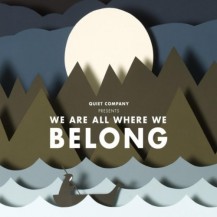Quiet Company’s “We Are All Where We Belong”
“The album is an introspective followup that contains catchy hooks, powerful vocal harmonies, and incredibly challenging lyrics.” -Andrew Conner
Guest Writer
9
out of 10
Quiet Company
We Are All Where We Belong
October 4, 2011
Unsigned
The indie power pop ensemble Quiet Company — coming off their album, Songs for Staying In — has self-released their fourth album, “We Are All Where We Belong.” The album is an introspective followup that contains catchy hooks, powerful vocal harmonies, and incredibly challenging lyrics. “It is easily the most personal thing I’ve ever written”, front-man Taylor Muse commented. The album charts the course through a breakup, traveling through several emotional extremes, “only the romance that’s ending was between myself and religion.”
Initially a solo project of Muse, a former contributor to Eisley, Quiet Company kept their indie-pop sound and familiar harmonies in this album, and also added heart-tugging orchestral arrangements (prominently featured in “The Black Sheep & Shepherd”), a church organ (in the opening track, “The Confessor”), and even subtle pop-punk sounds (“We Went to the Renaissance Fair”). Overall, the sound is enjoyable and accessible. Though it contains many elements common to other indie-pop bands, the band is quite talented and polished.
Lyrically, this album forages through new territory for the band. Throughout the album, Muse spins a tale of questioning and separating from religion and faith. The majority of the album contains very deep and introspective lyrics dominated by sadness, doubt, and regret. However, Muse refrains from making bold statements such as “there is no God.” Rather, he chronicles his own personal falling out with belief in God, often from feeling that God was never there. In “Set Your Monster Free,” he tells his daughter that he is often wrong, and encourages his daughter to “make up your own mind, because you don’t have to waste your time holding on to beautiful lies.”
Fundamentally, the record is a love story. A story of broken love between him and God, and of his love of his wife and daughter. Both stories are beautiful, in very different ways. The album is a lyrical powerhouse. Many times it feels as though the audience is listening in on a personal conversation between himself and his family. In “Are You a Mirror?”, Muse sings to his young daughter: “I hope you love me when you know me well, because I look inside you and I see myself.” Regardless of the listener’s beliefs, the words are tear-jerking.
The climax of his pain and hurt from religion comes in “The Black Sheep & Shepherd.” Muse says it best himself: “Because I’ve never heard Jesus speak to me (not in any way that I’d consider speaking) but I bowed my head just the same… Hey god! Now I’ve got a baby girl. What am I supposed to tell her about you? Because her life shouldn’t have to be like mine. She shouldn’t have to waste her time on waiting on you, because you never do come through.” He continues to open his heart to the audience, lamenting how God never came when he nearly killed himself. But alas, in the end, he finds relief and joy. “But luckily I held out long enough to see that everybody really makes their own destiny. It’s a beautiful thing. It’s just you and me, exactly where we belong, and there’s nothing inherently wrong with us.”
This is not your typical indie-pop casual listening music. It is deep, it hits hard. Yet, no matter what you believe about religion, the album has volumes to tell. It speaks of the brokenness common to all humanity, believer or not. It tells of heartbreak and loss, but also life past hurt and betrayal.
